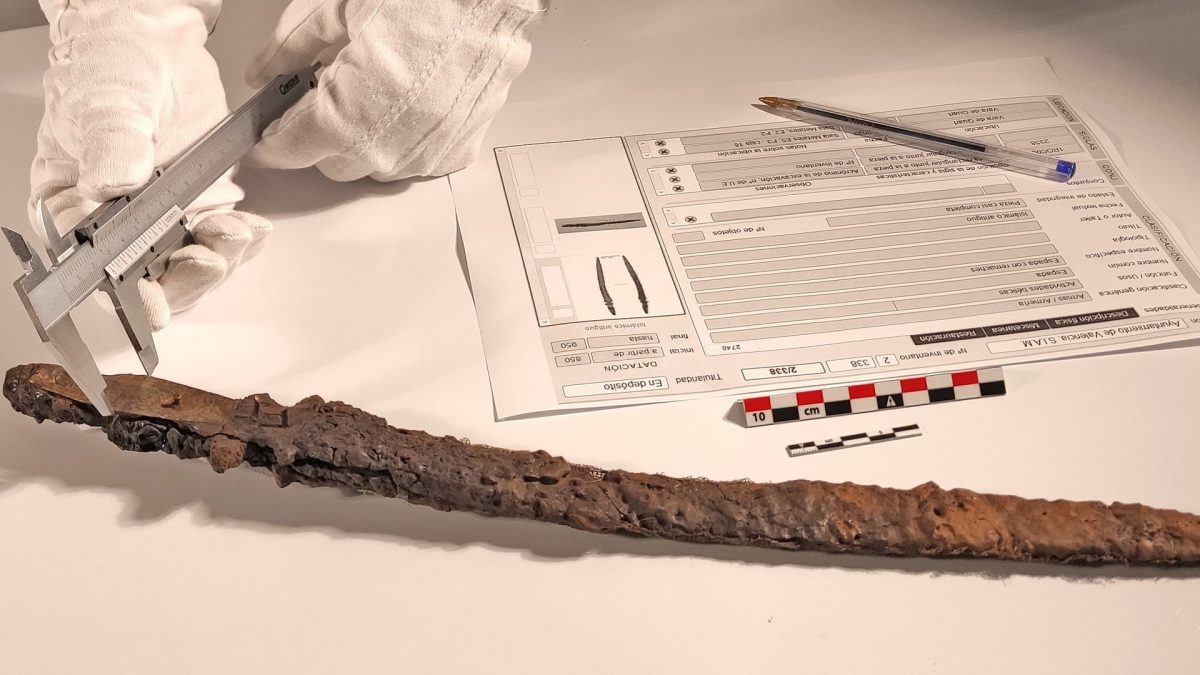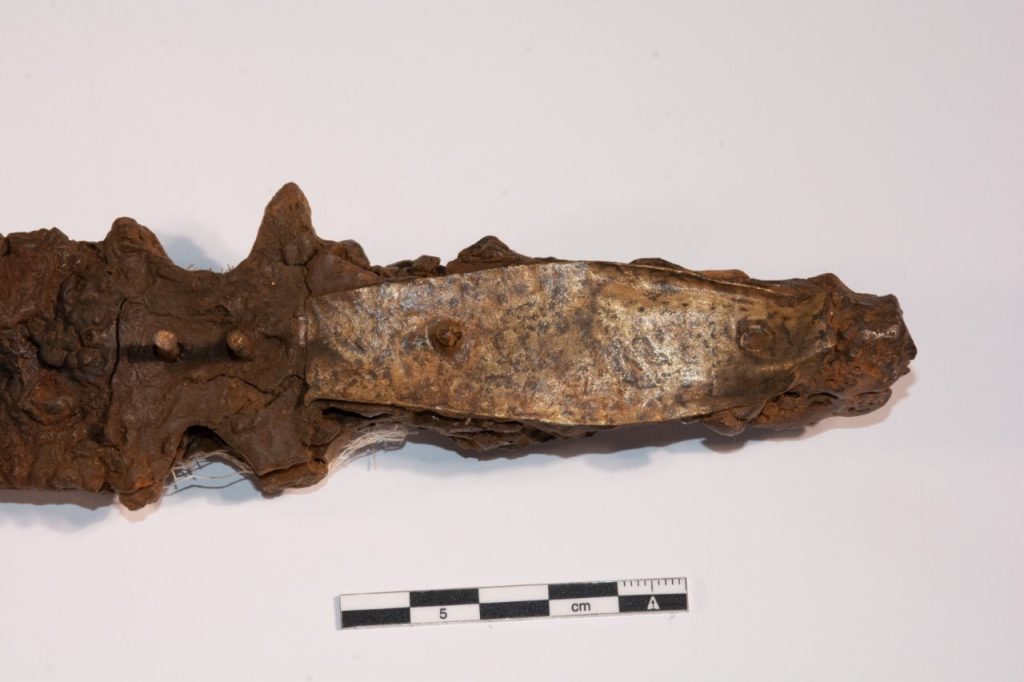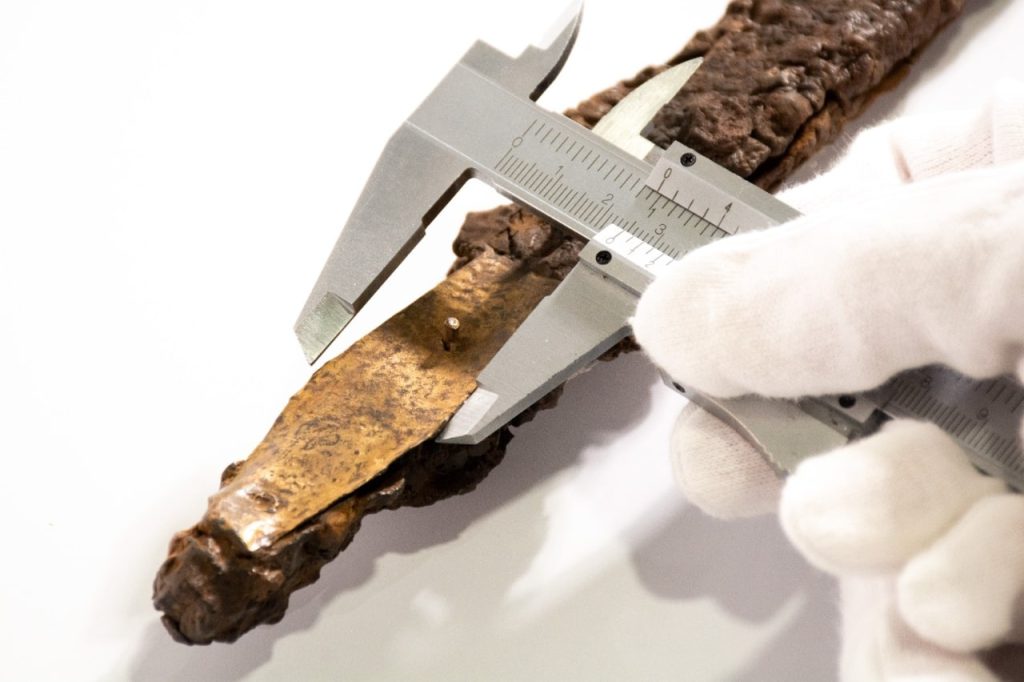
Researchers have finally unraveled the mysteries of the historical sword discovered in Spain 30 years ago, which they named ‘Excalibur’ because of its location, which evokes similarities with the legendary sword of King Arthur.
The iron sword was first discovered stuck in the ground upright in 1994 at an archaeological site in Valencia’s old town, a city on the eastern coast of Spain. This location, which is north of the old Roman Forum, has seen the rise and fall of many cultures over Valencia’s turbulent history.
For the past 30 years, the sword’s origin and age have remained a point of confusion — until now.
Valencia’s archaeology department decided to catalog and review the artifacts in its collection ahead of its 75th anniversary, the City Council of Valencia said in an April 22 news release. One of those artifacts was the Excalibur sword.
Since its unearthing, the sword’s true age has eluded scholars. However, recent efforts by the Archaeology Service (SIAM) of the Valencia City Council have shed light on its origins, reports Horta Noticias. Through meticulous dating techniques, they have determined that the sword hails from the 10th century, firmly establishing its antiquity at over a millennium old.

The iron sword was first discovered stuck in the ground upright in 1994 at an archaeological site in Valencia’s old town, a city on the eastern coast of Spain. This location, which is north of the old Roman Forum, has seen the rise and fall of many cultures over Valencia’s turbulent history.
For the past 30 years, the sword’s origin and age have remained a point of confusion — until now.
Valencia’s archaeology department decided to catalog and review the artifacts in its collection ahead of its 75th anniversary, the City Council of Valencia said in an April 22 news release. One of those artifacts was the Excalibur sword.
Since its unearthing, the sword’s true age has eluded scholars. However, recent efforts by the Archaeology Service (SIAM) of the Valencia City Council have shed light on its origins, reports Horta Noticias. Through meticulous dating techniques, they have determined that the sword hails from the 10th century, firmly establishing its antiquity at over a millennium old.

A close-up shot of the hilt Warrior Sword from Valencia.
Photo: SERVICI D’ARQUEOLOGIA DE L’AJUNTAMENT DE VALÈNCIA SIAM
SIAM’s analysis indicates that this sword represents the first discovery of its kind from the Islamic era in Valencia. Swords from this period are generally scarce in Spain, particularly in Valencia, where the soil’s composition poses challenges to preservation efforts.
Archeologist José Miguel Osuna, who led the research project on “Excalibur” earlier this year, found that the 18 inch-blade was from the Islamic period because of its hilt, decorated with bronze plates and notches for handling. The sword’s curved metal tip caused confusion among researchers, who thought it might have belonged to the Visigoths, but Osuna later disproved this idea.

The sword’s size and the fact that it doesn’t have a hand guard suggest that a mounted warrior may have used it in the Andalusian caliphal era. Municipal technicians are clear that its origins are in the Islamic era of Balansiya, even though it may display evolutionary traits from Visigothic models. Only one comparable specimen has surfaced thus far, unearthed amidst the excavations of Medina Azahara, the illustrious caliphal city commissioned by Abderramán III in Córdoba. The Islamic period in Spain began in A.D. 711 and ended in A.D. 1492.
“Thanks to the archaeology scholarship convened by the Valencia City Council, the archaeologist José Miguel Osuna is carrying out a detailed study of analysis of metallic objects that go from Roman times to the late medieval period and where a new and exceptional find has come to light, which we have called the Excalibur de Roc Chabàs to be very similar to the legendary sword of King Arthur.” José Luis Moreno, Valencia councilor for cultural action, heritage, and cultural resources, said in a press release.
City council cultural representative José Luis Moreno noted in the release that the sword was just one of many artifacts — from the Roman era to the late medieval period — being studied in the city’s archeological collection for the department’s 75th anniversary.
Valencia City Council
SIAM’s analysis indicates that this sword represents the first discovery of its kind from the Islamic era in Valencia. Swords from this period are generally scarce in Spain, particularly in Valencia, where the soil’s composition poses challenges to preservation efforts.
Archeologist José Miguel Osuna, who led the research project on “Excalibur” earlier this year, found that the 18 inch-blade was from the Islamic period because of its hilt, decorated with bronze plates and notches for handling. The sword’s curved metal tip caused confusion among researchers, who thought it might have belonged to the Visigoths, but Osuna later disproved this idea.

An expert is measuring the Islamic-era sword discovered in Valencia in 1994, known as Excalibur, has been dated back to the 10th century.
Photo: SERVICI D’ARQUEOLOGIA DE L’AJUNTAMENT DE VALÈNCIA SIAM
The sword’s size and the fact that it doesn’t have a hand guard suggest that a mounted warrior may have used it in the Andalusian caliphal era. Municipal technicians are clear that its origins are in the Islamic era of Balansiya, even though it may display evolutionary traits from Visigothic models. Only one comparable specimen has surfaced thus far, unearthed amidst the excavations of Medina Azahara, the illustrious caliphal city commissioned by Abderramán III in Córdoba. The Islamic period in Spain began in A.D. 711 and ended in A.D. 1492.
“Thanks to the archaeology scholarship convened by the Valencia City Council, the archaeologist José Miguel Osuna is carrying out a detailed study of analysis of metallic objects that go from Roman times to the late medieval period and where a new and exceptional find has come to light, which we have called the Excalibur de Roc Chabàs to be very similar to the legendary sword of King Arthur.” José Luis Moreno, Valencia councilor for cultural action, heritage, and cultural resources, said in a press release.
City council cultural representative José Luis Moreno noted in the release that the sword was just one of many artifacts — from the Roman era to the late medieval period — being studied in the city’s archeological collection for the department’s 75th anniversary.
Valencia City Council
No comments:
Post a Comment